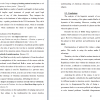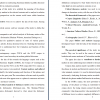Тема: The phrase Under God in modern American culture: meaning and controversy (the NOW corpus)
Закажите новую по вашим требованиям
Представленный материал является образцом учебного исследования, примером структуры и содержания учебного исследования по заявленной теме. Размещён исключительно в информационных и ознакомительных целях.
Workspay.ru оказывает информационные услуги по сбору, обработке и структурированию материалов в соответствии с требованиями заказчика.
Размещение материала не означает публикацию произведения впервые и не предполагает передачу исключительных авторских прав третьим лицам.
Материал не предназначен для дословной сдачи в образовательные организации и требует самостоятельной переработки с соблюдением законодательства Российской Федерации об авторском праве и принципов академической добросовестности.
Авторские права на исходные материалы принадлежат их законным правообладателям. В случае возникновения вопросов, связанных с размещённым материалом, просим направить обращение через форму обратной связи.
📋 Содержание
Chapter 1: Theoretical justification of research methods used to study culture and values of society
1.1 The content and interrelation of key concepts and methods of corpus research………………………………………………………. 8
1.1.1 Key notions of the study (phrase, idiom, perception, interpretation, value, evaluation, marker)…………………………….. 8
1.2 Linguistic methods used………………………………………… 16
1.2.1 Corpus studies: the role of corpus research in studying culture and values of society………………………………………………………. 16
1.2.2 Discourse analysis. Critical discourse analysis…………………. 22
1.2.3 Comparative and critical analysis. The concept of comparison… 27
1.2.4 Lexicographic method…………………………………………... 28
1.2.5 Context analysis. The concept of context……………………….. 31
1.2.6 Cultural studies. The concepts of culture, ideology and identity... 32
1.2.7 Interrelation of research methods………………………………… 40
1.3 The role of the Christian tradition in shaping American culture and American identity.
1.3.1. The idea of natural law in the formation of American culture….. 41
1.3.2. The American system of cultural values. American identity. Historical perspective………………………………………………….. 45
1.3.3. The American system of cultural values nowadays (years 2000-2024). American identity through the lens of Christianity……………. 50
1.3.4. Pledge of Allegiance. Under God as a marker of American identity………………………………………………………………… 54
1.4 Conclusion………………………………………………………... 59
Chapter 2: Application of corpus research methods to define the meaning and evaluative potential of the under God marker of American identity for the period of 2020-2023
2.1 Identification of the meaning of the under God marker in dictionaries and corpora……………………………………………… 61
2.1.1 Analysis of dictionary definitions of the word God…………… 62
2.1.2 Analysis of the meaning of the word God based on the COCA corpus………………………………………………………………….. 65
2.1.3 Analysis of the under God marker in COCA and COHA case materials (meaning and dynamics)……………………………………. 66
2.2 Analysis of the under Godmarker in the NOW Corpus……… 72
2.2.1 The range of evaluations of the American identity marker under God……………………………………………………………………. 72
2.2.2. The text as a statement and solution of the problem. Value conflicts related to the under God contexts……………………………76
2.3. Conclusions………………………………………………………. 79
Conclusion…………………………………………………………….81
References…………………………………………………………….82
List of dictionaries used……………………………………………… 86
Internet sources………………………………………………………. 87
List of sources of language material………………………………… 88
📖 Введение
The study discusses how the phrase under God functions as an American identity marker and the way it is used in various types of texts by representatives of various social groups and ideological trends.It also considers the history of the phrase and its connection with the concept of the American nation as such, as well as the reasons for the ambivalent perception of this phrase in modern speech genres.
The relation between language and culture is actively explored in the areas of discourse analyses, corpus linguistics, and identity studies. The cultural situation in America is of interest due to rapid evolutionary processes and a large number of cultural and social conflicts. A large number of studies in this field are published annually.
The theoretical framework of the paper rests on the combined methodology using theoretical resources from a number of research fields, which will make it possible to reveal the linguistic mechanisms of the functioning of the phrase under God as an identity marker in texts addressing topical social issues in modern American culture.
The subject of this paper is the usage of the phrase under God as one of the markers of American identity. The study focuses on the analysis of this phrase in modern contexts taken from language corpora, providing an opportunity to study the significance of the phrase in constructing American identity in public discourse nowadays and to identify its evaluative potential.
The primary aim of this study is to establish the meaning of the phrase under Godas an identity marker in the selected contexts and to analyze its relation to various ideological perspectives on the current social issues within American culture.
A number of objectives were set to achieve the aim of the study. Among them are:
• Reviewing theoretical sources and key concepts of the study to define the analytical method.
• Conducting the comparative and critical analysis of dictionary entries of the word God in American dictionaries (Merriam Webster, American Heritage etc.)
• Collecting material for qualitative analysis of texts of various genres: journalistic texts, news articles, fiction, historical texts etc. Studying the historical corpus COHA in order to understand how the evaluation and function of this phrase has changed over time.
• Studying the contemporary corpus COCA and the NOW corpus to understand how the phrase is used nowadays in modern political discourse.
In order to reach the aim of the research the language corpora such as the Corpus of Historical American English (COHA), the Corpus of Contemporary American English (COCA) and the News on the Web corpus (the Now corpus), as well as number of internet sources were analyzed. Context analyses and cultural studieswere used to identify the initial meaning and function of this phrase and how it has changed over the past years.The concordance software made it possible to determine which words most often appear next to a phrase in sentences and texts containing it – in micro and macro contexts.
Comparative and critical analysis of dictionary entries of the word God in American and British dictionaries (Dictionary.com, The Merriam-Webster dictionary, The Britannica dictionary) showed to what extent the dictionary definitions correspond to what Under God is in texts, whether they overlap with what God is in texts and micro contexts or not.
...
✅ Заключение
1. All linguistic methods are interrelated and socially stipulated. Language reflects subtle changes of social life.
2. The methods of corpus linguistics combined with the lexicographic method and Critical Discourse Analysis are an effective tool for identifying the meaning and controversy arising in connection with the use of a specific word or a phrase.
3. The concept of God has a huge positive potential for American people, representing primarily a source of justice, goodness and grace, which means it can be used to reinforce controversial ideas. When the aspect of God's ruling of human life is touched upon, the concept becomes a source of controversy.
4. The concept of God and the phrase under God in particular have always reflected core American values, despite the fact that the understanding of the essence of these values has been changing. These changes reflect major trends in American society such as the decline in the number of Christians. They also indicate that core American values have been reassessed over time.





